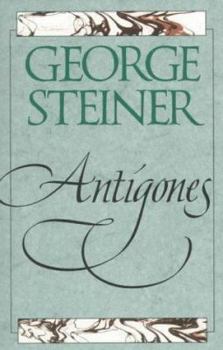Antigones: How the Antigone Legend Has Endured in Western Literature, Art, and Thought
Select Format
Select Condition 
Book Overview
According to Greek legend, Antigone, the daughter of Oedipus, secretly buried her brother in defiance of the order of Creon, king of Thebes. Sentenced to death by Creon, she forestalled him by committing suicide. The theme of the conflict between Antigone and Creon-between the state and the individual, between man and woman, between young and old-has captured the Western imagination for more than 2000 years. George Steiner here examines the far-reaching...
Format:Paperback
Language:English
ISBN:0300069154
ISBN13:9780300069150
Release Date:October 1996
Publisher:Yale University Press
Length:328 Pages
Weight:0.85 lbs.
Dimensions:0.9" x 5.6" x 8.1"
Customer Reviews
2 ratings
Essential reading for a classical education
Published by Thriftbooks.com User , 17 years ago
I read Sophocles Antigone for graduate Humanities class. It is an essential reading to understand Greek Tragedy. It is also a foundation stone of literature in studying Western Civilization. Steiner's book was a great resource in understanding Greek Tragedy. Antigone, daughter of Oedipus in 3-cycle play, faces capital punishment for burying her brother who rebelled against Thebes. Obeying instincts of loyalty of love and the divine law, she defies Creon, the King and her uncle. Creon says laws of states outweigh all other laws, and family loyalty, when he finally relents it's too late. Over the centuries there has been a great deal made about the conflicts played out in the play, law of state vs. law of goods, personal vs. state duties. Loves knowledge vs. state knowledge. Greek understanding of tragedy- Aristotle lays down understanding of Greek tragedy. He based it on Sophocles. Tragedy- most important thing for tragedy is plot, it is all essential. Tragedy defined as- is imitation of an action that is serious, complete and of a certain magnitude in language embellished with incidents arousing pity and fear ant to the audience it accomplishes catharsis of such emotions. Every tragedy must have six parts that determine its quality. 1. plot 2. character 3. diction 4. fault 5. spectacle and 6. melody. According to Aristotle, tragedy is higher and more philosophical than history or poetry; it is one of the highest expressive forms because it dramatizes what may happen. History is a narrative that tells you what has happened tragedy shows what is possible. History deals with particulars, tragedy deals with the universal. Tragedy creates a cause and effect chain and shows how the world operates. It frames human experience in universal discourse, tragedy is central in this effort. Tragedy arouses pity and fear in audience because we can envision ourselves caught in this cause and effect chain. Plot most important feature, the arrangement of incidents, the way incidents, and action is structured. Tragedies outcome depends on the outcome of these cause and effect changes not on being character driven. Plot must be whole, beginning middle and end. Beginning must have a motivation that starts the cause and effect chain of events must be a center or climax that is caused by earlier incidents. There must be an end some kind of closure caused by earlier events in tragedy. This is all part of the complication of the tragedy all must be connected. You can't have a dues ex machnia in a superior tragedy. In tragedy, the hero or heroine walks knowingly towards the fate that is written and can't be changed. Unity of action plot must be structurally self-contained, each action leading invariably to the next without outside intervention. The worst kinds of plots are episodic, like a Jerry Seinfeld sitcom, can't be something about nothing, must have unity of action. Magnitude, quantatively meaning length, and quality of action, i
very extensive and interesting
Published by Thriftbooks.com User , 25 years ago
This book recounts the long history of "Antigone," the famous Sophoclean play. It covers philosophical, literary, and stage interpretations of the myth and the work. A well-educated literary translator, George Steiner pays great attention to the language of the original, as well as its translations throughout the ages. A must for anyone who is interested in Greek tragedy for the present.





